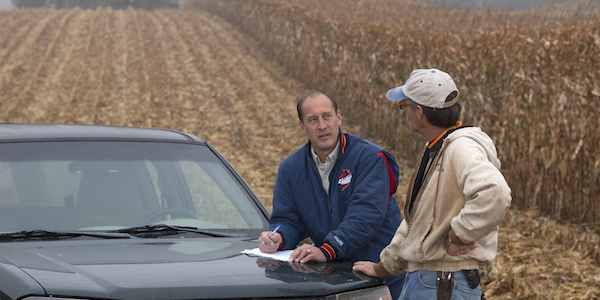
Changing How We Understand Change
In the early 1940s the nation was embroiled in a World War and recovering from the Great Depression and a prolonged, devastating drought. Several years before, a new innovation hit the market shown in field trials to increase corn yields by 20 percent or more and to resist drought. It was hybrid corn, developed commercially by Iowa State alum Henry A. Wallace (’10 animal science, MS ’20).
Adoption of this new technology, while slow at first, was complete throughout Iowa by 1942, within approximately 13 years of its commercial release. This rapid adoption of an agricultural technology captured the attention of Iowa State Sociology Professor Bryce Ryan and administrators of the Iowa Agricultural Experiment Station.
In 1942, the Experiment Station funded a study by Ryan in order to better understand diffusion of innovation to aid adoption of future farm innovations.
Adoption and Diffusion
For the study, Ryan created a rural survey and charged his research assistant, Neal C. Gross, with the task of interviewing 300 farmers in the Iowa communities of Scranton and Grand Junction regarding their adoption of hybrid corn.
Ryan’s interview methodology and his published results became a model for studying and understanding what influences an individual’s decision to adopt a new technology and how adoption spreads among a population. The framework that emerged from his study emphasized “knowledge bringers,” self-experimentation, opinion leaders and interpersonal communications as influences to adoption and diffusion.
Since Ryan’s study, thousands of similar diffusion studies and papers have been published, each reinforcing and building on his seminal theories. Everett Rogers, who participated in rural sociology graduate studies under Iowa State Professor George Beal, is known for popularizing Ryan’s theories with his book, “Diffusion of Innovations,” which was published in 1962 and continues to influence sociological research.
Factoring in outside factors
Today, J. Gordon Arbuckle Jr. and his colleagues in Iowa State’s sociology department research conservation practice adoption, “much of which is rooted strongly in the adoption diffusion tradition,” says Arbuckle.
Arbuckle is an associate professor of rural sociology and is the co-director of the Iowa Farm and Rural Life Poll, an annual survey of Iowa farmers, popularly known as “The Farm Poll.”
“A difference today is we are trying to expand our research to account for the influence of institutions, such as farm policy, markets, and other actors and forces that may serve as facilitators or barriers to the adoption of a technology.
Another difference is researchers now examine the environmental and social consequences of the adoption of agricultural innovations—there’s a concern for long-term consequences and benefits, in addition to the short-term,” he says. “The Farm Poll is a valuable tool for helping stakeholders gain insight into farmer perspectives on agricultural issues,” says Arbuckle. “Every year I work with agricultural scientists and agency staff to develop questions for the survey.”
In 2013, for example, Arbuckle worked with agronomy and entomology faculty to develop questions about herbicide resistant weeds and Bt-resistant corn rootworm.
“These are pressing problems in the state,” Arbuckle says, “The information we gather on farmer knowledge, concerns, and current behaviors can help to guide extension and outreach programming on such issues.”
Searching for the missing pieces
Arbuckle recently looked into the adoption of Iowa’s Clean Water State Revolving Fund—low interest loans available to help farmers fund conservation practices to reduce runoff. In 2007, state program administrators, concerned the program was underutilized, asked Arbuckle and colleagues to help them find out why.
The study included focus groups with field staff responsible for implementing the loan programs. Findings showed loan recipients were highly satisfied with the loans, but many field staff had not learned enough about the programs to adequately promote them. The research helped state administrators remove adoption barriers for field staff and farmers. As a result, Iowa farmers have obtained millions of dollars for needed conservation efforts.
Arbuckle says his ability to develop adoption-diffusion-related questions for the Farm Poll is enhanced by collaborations with key personnel at the Iowa Departments of Agriculture and Natural Resources, Iowa Soybean Association, Iowa Corn Growers Association, Farm Bureau, Iowa Legislature and mass media.
“My work is always a piece of a larger puzzle,” says Arbuckle. “I never have all the answers, but I like to think it helps people who make decisions to make better decisions that serve the needs of agricultural communities.”



